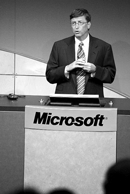Facing pressure inside and out, software giant pledges support for gay rights locally and in D.C.
In the course of not quite a month, Redmond, Washington-based software giant Microsoft has swung from being a model corporate citizen (Microsoft sets “a high standard for others by exhibiting leadership in advancing the cause of GLBT equality,” intoned the text of a Corporate Vision Award from the Los Angeles Gay and Lesbian Center), to corporate pariah (“offensive” said the LA Center’s Lorri Jean, echoing the sentiments of many gay rights organizations), to model corporate citizen again when on May 6 it announced they would again support a Washington State anti-discrimination law which they had abandoned in April.
The company’s trouble started when its corporate counsel, Brad Smith, sat down with Redmond-based fundamentalist minister Ken Hutcherson, who is also a leading figure in national evangelical causes. Microsoft denied Hutcherson’s influence, but the minister, who runs nearby Antioch Bible Church, said later said that facing the threat of a boycott by Hutcherson’s group and other Christian evangelicals, Microsoft agreed to shift to a neutral position on the proposed Washington legislation.
The bill, HB 1515, had cleared the state House of Representatives and the state’s new Democratic governor, Christine Gregoire, had promised to sign it. When it failed by one vote in the state Senate, George Cheung, the head of Equal Rights Washington, the state’s gay rights group, drew a direct line from Microsoft’s flip to the bill’s defeat.
Gay rights groups heaped criticism on the company.
“[It] struck a blow to fairness for all Washingtonians,” said the Washington, DC-based Human Rights Campaign.
But according to Cheung and the head of the National Gay and Lesbian Task Force, the biggest force that moved the giant back was internal pressure from employees.
“First and foremost it was the organizing and the heartfelt advocacy of Microsoft employees,” said the Task Force’s leader, Matt Foreman. “This was driven much more by the internal processes than any kind of external pressure.”
Employees circulated a petition that, according to Cheung, was signed by more than 1,700 employees demanding that Microsoft reverse its position.
One of the officers of Microsoft’s gay employee group, Jeff Koertzen, quit his job over the issue “to pursue opportunities to unite my passions of technology and LGBT rights,” he told Planet Out.
Outside the company, gay groups in Washington State labored to reverse Microsoft’s decision. “We worked tirelessly,” said Cheung.
But according to Cheung, possibly the single most influential external gesture may have been beamed at them from down the coast in Los Angeles, when the LA Center demanded its award back.
The decision to drop support of the bill, the LA Center’s Lorri Jean said, “sends a message that the rights of the GLBT community are not only negotiabledispensable.”
“That was a big embarrassment for them,” Cheung said.
Of Microsoft’s initial decision Cheung said, “They thought it would it would just slide under the radar,” and added “I don’t think they were expecting bad publicity.” But the story has been widely covered in newspapers from the local Seattle press to The New York Times.
Last Thursday, the company sent its director of corporate diversity, Claudette Whiting, to a meeting at the Seattle Gay and Lesbian Center. Demonstrating what Cheung called an “open corporate culture” in Microsoft, she encouraged the gay groups to keep up the pressure.
On the same afternoon, Microsoft’s director of corporate citizenship, Dan Bross, called the LA Center to have a 45-minute conversation with Jean and Jim Key, another top official there. According to Key, Bross hinted that the company was rethinking its stance after what Key called a “colossal PR disaster.”
The next day Microsoft President Steve Ballmer sent a memo to the company’s employees.
“Microsoft will continue to join other leading companies in supporting federal legislation that would prohibit employment discrimination of the basis of sexual orientation,” he wrote, and added “if legislation similar to HB 1515 is introduced in future sessions, we will support it.”
Cheung said that members of his board at Equal Rights Washington speculated that the original decision was made without the consent of Microsoft’s upper management.
Microsoft chairman Bill Gates’ foundation has given nearly one billion dollars to AIDS related charities and research in the past several years, and, according to the HRC, the company’s employment policies have been a model for many other corporations.
Foreman agreed with Cheung’s assessment. “It was very clear that it was not vetted through appropriate channels. If it had been, this turnaround would never have happened so quickly.”
Corporate counsel Brad Smith, the vice president who met with Pastor Hutcherson, was traveling in Europe at the time the controversy broke, said Microsoft spokeswoman Tami Bregasse, and was not available for comment this week as of press time.
While the Antioch Bible Church’s Ann Comer said both she and Hutcherson were “disappointed” and “frustrated,” Foreman called the turnabout “admirable,” and said that it has significance beyond Microsoft and Washington State.
“Corporations across the country look to Microsoft around a number of issues including personnel,” he said. “That Microsoft changed its position on this bill focuses more attention on Microsoft’s pro-gay policies. It’s a very positive, educational moment for corporate America.”
gaycitynews.com


































